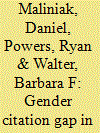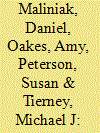|
|
|
Sort Order |
|
|
|
Items / Page
|
|
|
|
|
|
|
| Srl | Item |
| 1 |
ID:
124398


|
|
|
|
|
| Publication |
2013.
|
| Summary/Abstract |
This article investigates the extent to which citation and publication patterns differ between men and women in the international relations (IR) literature. Using data from the Teaching, Research, and International Policy project on peer-reviewed publications between 1980 and 2006, we show that women are systematically cited less than men after controlling for a large number of variables including year of publication, venue of publication, substantive focus, theoretical perspective, methodology, tenure status, and institutional affiliation. These results are robust to a variety of modeling choices. We then turn to network analysis to investigate the extent to which the gender of an article's author affects that article's relative centrality in the network of citations between papers in our sample. Articles authored by women are systematically less central than articles authored by men, all else equal. This is likely because (1) women tend to cite themselves less than men, and (2) men (who make up a disproportionate share of IR scholars) tend to cite men more than women. This is the first study in political science to reveal significant gender differences in citation patterns and is especially meaningful because citation counts are increasingly used as a key measure of research's quality and impact.
|
|
|
|
|
|
|
|
|
|
|
|
|
|
|
|
| 2 |
ID:
066178


|
|
|
| 3 |
ID:
107811


|
|
|
|
|
| Publication |
2011.
|
| Summary/Abstract |
Using two new data sources to describe trends in the international relations (IR) discipline since 1980-a database of every article published in the 12 leading journals in the field and three surveys of IR faculty at US colleges and universities-we explore the extent of theoretical, methodological, and epistemological diversity in the American study of IR and the relationship between IR scholarship and the policy-making community in the United States. We find, first, that there is considerable and increasing theoretical diversity. Although US scholars believe and teach their students that the major paradigms-realism, liberalism, Marxism, and constructivism-define and divide the discipline, most peer-reviewed research does not advance a theoretical argument from one of these theoretical traditions. There is no evidence, moreover, that realism and its focus on power relations among states dominate, or since 1980 ever has dominated, the literature. Second, although three times as many IR scholars report using qualitative methods as their primary approach, more articles published in the top journals currently employ quantitative tools than any other methodological approach. Third, there exists little epistemological diversity in the field: American IR scholars share a strong and growing commitment to positivism. Finally, there is a disjuncture between what American scholars of IR think about the value of producing policy-relevant work and the actual research they generate: few articles in top journals offer explicit policy advice, but scholars believe that their work is both prescriptive and useful to policymakers.
|
|
|
|
|
|
|
|
|
|
|
|
|
|
|
|
| 4 |
ID:
160742


|
|
|
|
|
| Summary/Abstract |
Using data from the Teaching, Research, and International Policy (TRIP) project, we address several questions posed by students of the international relations (IR) discipline, specifically, whether and to what extent: US scholars, institutions, and journals dominate the field; national communities of IR scholars are insular or inward-looking; and/or the discipline is theoretically, methodologically, and epistemologically diverse. We draw from two major data sources: a series of cross-national surveys of IR faculty in thirty-two countries and a database of journal articles published in the twelve leading IR journals from 1980 to 2014. We find obvious signs of US hegemony and insularity. Other national IR communities are relatively open to foreign ideas, if not to hiring scholars trained in other countries. Finally, despite US hegemony in the discipline and pockets of geographic insularity, we see a diverse field characterized by a wide range of theoretical, methodological, and epistemological commitments. We conclude with a discussion on the sources and consequences of diversity in the international relations discipline.
|
|
|
|
|
|
|
|
|
|
|
|
|
|
|
|
| 5 |
ID:
165509


|
|
|
|
|
| Summary/Abstract |
Many observers of the international relations (IR) discipline express concern about the decline in policy-relevant research within the academy. Some blame an academic culture and academic institutions that incentivize abstract, quantitative, or theoretical work that speaks to scholarly debates rather than real-world problems. This article asks how IR scholars value both scholarly and policy publications. Using data from the TRIP survey, we found that publications generally considered policy relevant are undervalued in academic tenure decisions. These findings hold regardless of whether faculty have attained tenure or whether they consider their own research to be policy relevant. However, scholars who consult, teach at colleges rather than research universities, or teach in Association of Professional Schools of International Affairs schools rather than political science departments are likely to believe: (1) that policy-relevant research products are currently valued more highly than their colleagues estimate; and (2) on the normative question, that these policy publications should be valued even more highly than they are. Overall, these results suggest an openness to increasing the value of policy-relevant research in tenure decisions as part of an effort to increase the amount of policy-focused work in the discipline.
|
|
|
|
|
|
|
|
|
|
|
|
|
|
|
|
| 6 |
ID:
156199


|
|
|
|
|
| Summary/Abstract |
Zigerell (this issue) cites the findings of his recent reanalysis (Zigerell 2015) of the data in our 2013 study of the gender citation gap in the international relations literature to support his claim that our study showed a “preference for statistically-significant results.” We thank Zigerell for so closely engaging with our work. However, we note that he is focused on how his changes to our sample affect a single model in our original paper, highlight the fact that we reported statistically insignificant results when they arose in our original analyses, and review the findings of other recent re-analyses of our data. Ultimately, while we disagree with Zigerell’s conclusions about our work, we join Zigerell in calling for greater diversity in the discipline.
|
|
|
|
|
|
|
|
|
|
|
|
|
|
|
|
|
|
|
|
|